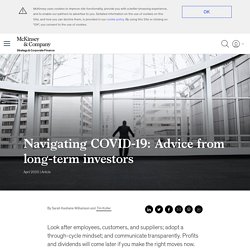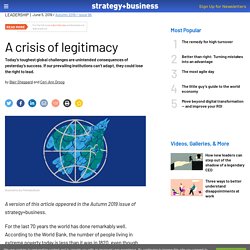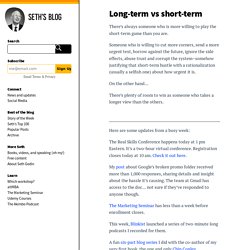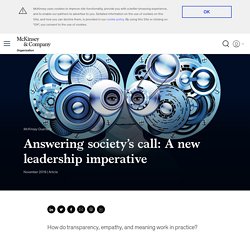

Making Waves: A Post Covid Response to Business Practices: Winning in the Short Term by thinking in the Long Term (14 February 2021) by Kim Boland. The case against corporate short termism. Policymakers and pundits alike have been raging against "short-termism" on the part of corporate managers for decades.

The critique is well-known: pressured by Wall Street analysts and investors poised to exit at the drop of a disappointing quarterly number, CEOs inflate short-term results to the detriment of long-term performance. But there has been precious little hard evidence that a failure to think long term actually harms companies' performance — and, more broadly, the performance of the American economy. That is, until now. The case against corporate short termism. The Long Time Project. LinkedIn by Tony Robbins on LinkedIn. Six Ways to Think Long-term. A Cognitive Toolkit for Good Ancestors (July 2020) A new stock exchange focused on the long-term. Advice from long-term shareholders about COVID-19. The global COVID-19 pandemic has presented executives with the most challenging times in their careers.

The COVID-19 Crisis Reveals How Short-Term, Shareholder-First Thinking Still Rules the Day. Managing Crises in the Short and Long Term. CURT NICKISCH: Welcome to the HBR IdeaCast from Harvard Business Review.

I’m Curt Nickisch. Ten years ago, on April 20, 2010, the Deepwater Horizon oil rig exploded in the Gulf of Mexico. The fireball was visible 65 kilometers away; eleven workers died. The explosion launched the biggest accidental oil spill in history. U.S. Our guest on the show today was on site with Admiral Neffenger, studying the response. Eric McNulty is the associate director of the National Preparedness Leadership Initiative at Harvard. Eric, thanks so much for joining us. ERIC MCNULTY: Curt, it’s a pleasure to be here. CURT NICKISCH: We’re now a few weeks, or even a few months into this COVID-19 pandemic, depending on where you are in the world. ERIC MCNULTY: It’s similar in that there is a major threat facing a population. CURT NICKISCH: One thing that seems particularly hard about this current situation is just the ongoing, uncertainty.
ERIC MCNULTY: Exactly. ERIC MCNULTY: Absolutely. A crisis of legitimacy. A version of this article appeared in the Autumn 2019 issue of strategy+business.

For the last 70 years the world has done remarkably well. According to the World Bank, the number of people living in extreme poverty today is less than it was in 1820, even though the world population is seven times as large. This is a truly remarkable achievement, and it goes hand in hand with equally remarkable overall advances in wealth, scientific progress, human longevity, and quality of life.
But the organizations that created these triumphs — the most prominent businesses, governments, and multilateral institutions of the post–World War II era — have failed to keep their implicit promises. As a result, today’s leading organizations face a global crisis of legitimacy. Businesses are also being held accountable in new ways for the welfare, prosperity, and health of the communities around them and of the general public.
Asymmetry: Prosperity derailed Disruption: Technology unbound. The Irony of an Infinite Mindset. Long-term vs short-term. There’s always someone who is more willing to play the short-term game than you are.

Someone who is willing to cut more corners, send a more urgent text, borrow against the future, ignore the side effects, abuse trust and corrupt the system–somehow justifying that short-term hustle with a rationalization (usually a selfish one) about how urgent it is. On the other hand… There’s plenty of room to win as someone who takes a longer view than the others. Here are some updates from a busy week: The Real Skills Conference happens today at 1 pm Eastern. My post about Google’s broken promo folder received more than 1,000 responses, sharing details and insight about the hassle it’s causing. The Marketing Seminar has less than a week before enrollment closes. This week, Blinkist launched a series of two-minute long podcasts I recorded for them. ESG (environmental, social, and governance) framework. Your business, like every business, is deeply intertwined with environmental, social, and governance (ESG) concerns.

It makes sense, therefore, that a strong ESG proposition can create value—and in this article, we provide a framework for understanding the five key ways it can do so. They Don't Know How Business Works. A new leadership imperative: Corporate social responsibility. Society’s expectations for business are rising.

Customers—particularly younger ones—want to know what the companies they engage with are doing for, with, and to the world. Nine in ten Generation Z consumers believe that companies have a responsibility to address environmental and social issues. Younger people think that environmentally and socially focused companies are better prospective employers, and the vast majority say they would be more loyal to companies aligned with those values. As demands for social accountability rise, so do demands on leaders. This article, based on a range of McKinsey research and case studies of leaders in action, provides a glimpse of the emerging new leadership imperative.
Is Maximizing Shareholder Value a Thing of the Past? The Purpose Effect by Dan Pontefract (Book summary) Rethinking the role of short term incentives. Many of us have been brought up to believe that we will get better outcomes if we pay people incentives.

This theory is based on behavioural experiments conducted on rats in laboratories, which has since been disproven by a range of different studies. Extensive research over various time periods (involving human beings) demonstrates that short-term incentives do not encourage the skills we need to exercise personal agency and self-authorship. Monetary incentives can often lead to worse outcomes for the individual, the organisation and the wider world.
In this article, we explore why short-term incentives don’t enable long-term success and consider alternative ways to enable greater engagement, motivation and outcomes. What Would It Take to Get Businesses to Focus Less on Shareholder Value?